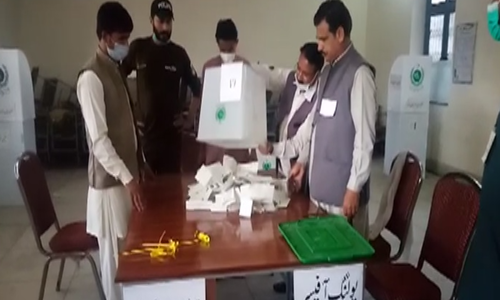ISLAMABAD: The Free and Fair Election Network (Fafen) has called upon parliament to consider an immediate review of the inefficacy of the first-past-the-post (FPTP) system to yield truly representative legislatures and governments and initiate a wide-ranging discourse and negotiations on the adoption of proportional representation (PR) system that guarantees translation of more than 95 per cent of votes cast into representation.
“The obsoleteness of FPTP is becoming more pronounced as the elections are becoming more competitive with polled votes splitting in triangular and at times quadrangular races as higher number of political parties and independent candidates are vying for national and provincial assemblies’ general seats,” a report released by Fafen on Wednesday said.
It noted that the PR system was better designed to handle such multipronged electoral races. “This system — already in practice for elections to the Senate, women’s reserved seats in the National Assembly (NA) and Provincial Assemblies (PAs) and third tier of local governments in Punjab — may also be extended to the elections to general seats in NA and PAs,” it stresses.
Report indicates results of last four general elections did not translate into any representation
An analysis of official election results indicates that more than half of the votes polled for the general seats in NA and PAs during last four general elections (GE) did not translate into any representation. Resultantly, the assemblies created after these elections represented only a minority of the polled votes as well as the registered votes and the overall population. Moreover, the federal and provincial governments formed after the elections represented even smaller proportions of the respective electorate.
The proportion of unrepresented votes in total polled votes have been gradually increasing since 2002, with the percentage of such votes in GE 2018 reaching an all-time high. Nearly 57 per cent of votes polled for NA general seats (31.1 million out of 54.8m) did not translate into any representation in last GE. Around 52pc votes polled for NA seats (24.3m out of 46.9m) had remained unrepresented in GE-2013, 50pc (17.7m out of 35.6m) in GE-2008, and 53pc (15.9m out of 30m ) in GE 2002
Similarly, 64pc of the popular vote polled for general seats in the Khyber Pakhtunkhwa Assembly did not translate into any representation in 2018, followed by 59pc votes polled for Balochistan Assembly seats, 58pc for the Punjab Assembly and 53pc for the Sindh Assembly. Moreover, the political parties which formed federal governments since 2002 and even before represented less than one-fifth of the registered voters, and less than one-third of the polled votes.
These statistics clearly indicate that the FPTP system has failed to reflect the majority voice in true representation of people’s free will, which, according to the Constitution of Pakistan, should establish an order for the state to exercise its powers and authority through the chosen representatives of the people. In the FPTP, voters can choose only one candidate, and the candidate with the most votes wins the election. The votes cast for losing candidates play no part in determining the election’s outcome in this voting system and are, therefore, not translated into representation.
Additionally, the FPTP does not incentivise the efforts of political parties for increasing the voter turnout as a candidate needs only one vote more than the runner-up to get elected. Any more votes polled in favour of a winning candidate are unnecessary. The winning candidates in GE-2018 received 11.8pc ‘unnecessary’ votes in excess of the number of votes required to win the election.
Pakistan is not the only country to face this problem. Many democracies have shifted to more advanced and progressive modes of elections such as various forms of the PR system. The PR systems, as against the FPTP, are better placed to reflect people’s will in the formation of governments. The PR systems essentially provide protection from establishment of governments representing the minority of voters and population.
Fafen noted that factoring out the majority vote by the FPTP has been one of the key contributors to political instability in the country and formation of weak federal and provincial governments. Now that the parliament is set to discuss the Elections (Amendment) Bill, 2020, it should also take stock of issues of representation and strengthen the elected houses by choosing a system that truly and realistically represents the will of the people in shape of their political choices, making each vote not only count but to also translate into representation.
Published in Dawn, May 20th, 2021















































